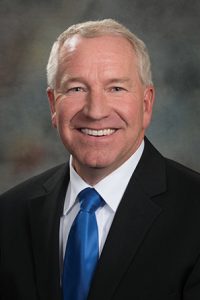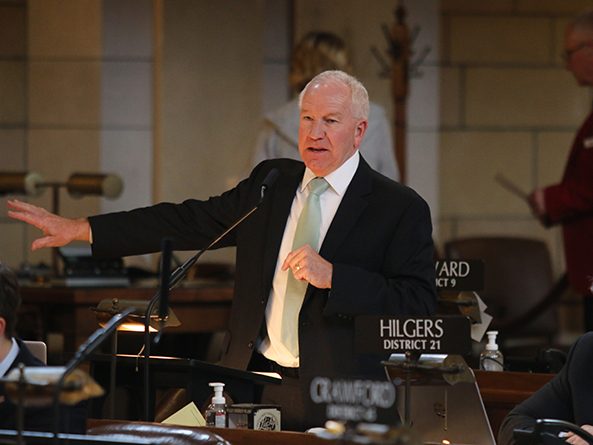Sales tax requirements for internet sellers advanced
Lawmakers gave second-round approval March 6 to a bill that would require some retailers without a physical location in Nebraska to collect state sales and use tax, pending a U.S. Supreme Court ruling in June.
As introduced last session by Sen. Dan Watermeier of Syracuse, LB44 would apply to retailers outside the state if their sales to Nebraska purchasers exceeds a certain amount. The requirement to pay sales and use taxes on internet purchases is not new, he said.
“Customers buying from remote sellers have always owed this tax, but they rarely pay it if the remote seller does not collect it,” Watermeier said. “The longer we wait before passing legislation like this, the harder it will be for the general public to understand that this is not a new tax.”
Senators voted 33-7 to adopt a Watermeier amendment that replaced the original provisions of the bill. It would require a retailer that does not collect state sales or use tax to notify Nebraska purchasers that the tax is due and to send them a notice by Jan. 31 of each year showing the total amount paid for taxable items. A retailer that fails to send the notifications would be subject to a $10,000 penalty.
A non-collecting retailer also would be subject to a $2,500 penalty for failing to send an annual report to the department showing the total amount paid for taxable items by Nebraska purchasers.
The requirements would apply to retailers with more than $100,000 in total annual sales of taxable items or 200 or more separate transactions to Nebraska purchasers.
Watermeier said the requirements would only affect businesses outside the state and would help Nebraska brick-and-mortar businesses, which are at a competitive disadvantage to internet retailers that are not required to collect state sales tax. The bill could help the state collect an additional $30 million to $40 million in revenue annually, he said.
The notice and reporting requirements would end on the later of July 1, 2018, or the first day of the first calendar quarter after a court decision or federal legislation repeals the physical presence requirement of a 1992 U.S. Supreme Court case. After that, a retailer without a physical presence in Nebraska would be subject to state sales and use tax if it meets the sales threshold.
In Quill Corp. v. North Dakota, the court found that states could not collect sales tax from retail purchases made over the internet if the seller does not have a physical presence in the state. The justices will rule on a South Dakota case challenging the Quill decision during the court’s 2018 term, which ends in June.
If the court does not overturn the case, Watermeier said, the notice and reporting requirements would serve as an incentive for some retailers to remit state sales tax voluntarily.
Sen. Sue Crawford of Bellevue, who spoke in support of the amendment, said that if the court does overturn Quill, LB44 would ensure that the state does not forego tens of millions of dollars in sales tax revenue over the next year.
“The fact that the Supreme Court is deciding this case this summer makes it all the more urgent for us to pass LB44,” she said.
Sen. Matt Williams of Gothenburg agreed that the Legislature should not wait another year to start collecting sales tax on internet purchases. He said the issue comes up at every one of his town hall meetings.
“Those businesses that are not in Nebraska now are competing every day with my Main Street businesses,” Williams said, “and they’re competing with your Main Street businesses also.”
Sen. Jim Smith of Papillion opposed the amendment, saying that the notice and reporting requirements would burden small businesses and give false hope to Nebraska retailers. At best, he said, the notices only would remind Nebraskans that sales and use tax is due on their internet purchases—it would not help the state collect it.
“This bill has no teeth in it, it’s poorly written and it simply does not do what is being promised here,” Smith said.
Lincoln Sen. Mike Hilgers also opposed the amendment, saying that it would create a new regulatory structure on uncertain legal ground. The proposal is based on a guess that the Supreme Court will overturn the physical presence requirement in the Quill case, he said, but no one knows exactly what the justices will decide. Hilgers said it would be wiser for the Legislature to wait for the court’s decision and then act next session.
“Putting a speculative guess into our statutes is something I cannot support,” he said.
Sen. Ernie Chambers of Omaha agreed, saying that Watermeier is speculating on the court’s ruling. He introduced a floor amendment that would remove a reference to the Quill decision in Watermeier’s amendment. It failed on a 7-35 vote.
After three hours of debate on select file, Watermeier filed a motion to invoke cloture, or to cease debate and vote on the bill. The motion succeeded 35-8.
Senators then voted 34-7 to advance the bill to final reading.


